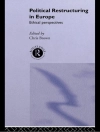In post-Soviet Russian politics, Boris Nemtsov is one of the most tragic figures—and not only because he was shot dead, at the age of 56, in close vicinity to the Kremlin, the locus of Russia’s power. The “transparency of evil” in this specific case was shocking: Nemtsov’s murder was filmed by a surveillance camera. The video tape confirms the demonstrative and insolent character of the assassination. His death illuminated a core feature of the current regime that tolerates, if not incites, extra-legal actions against those it considers to be “foes, ” “traitors, ” or members of “the Fifth Column.”
In this volume Boris Nemtsov is commemorated from different perspectives. In addition to academic papers, it includes personal notes and reflections. The articles represent a range of assessments of Nemtsov’s personality by people for whom he was one of the leading figures in post-Soviet politics and a major protagonist in Russia’s transformation. Some authors had direct experiences of either living in, or travelling to, Nizhny Novgorod when Nemtsov was governor there. The plurality of opinions collected in this volume matches the diversity and multiplicity of Nemtsov’s political legacy.
The volume’s contributors include: David J. Kramer, Senior Director at the Mc Cain Institute for International Leadership in Washington, DC; Miguel Vázquez Liñán, Associate Professor at Seville University; Yulia Kurnyshova, Research Fellow at the National Institute for Strategic Studies in Kyiv; Ekaterina Smagly, Director of the Kennan Institute in Kyiv; Henry E. Hale, Professor at The George Washington University in Washington, DC; Howard J. Wiarda (ᶧ2015), Professor at the University of Georgia; Sharon Werning Rivera, Associate Professor at Hamilton College; Tomila Lankina, Associate Professor at the London School of Economics and Political Science; Andre Mommen (ᶧ2017), Professor at the University of Amsterdam; Stefan Meister, Director at the German Council on Foreign Relations in Berlin; Vladimir Gel’man, Professor at the University of Helsinki; Vladimir V. Kara-Murza, coordinator of the Open Russia movement and deputy leader of the People’s Freedom Party of Russia.
लेखक के बारे में
The editors:
Dr. Andrey Makarychev is a Visiting Professor at the Johan Skytte Institute of Political Studies at the University of Tartu and an editor of the Journal of Soviet and Post-Soviet Politics and Society. He studied Political Science at the European Institute of Advanced International Studies in Nice and was a visiting fellow at George Mason University in Fairfax, Virginia, and at the Copenhagen Peace Research Institute. His articles have appeared in, among other journals, Problems of Post-Communism, European Regional and Urban Studies, Nationalities Papers, Geopolitics, International Spectator.
Dr. Alexandra Yatsyk is a Researcher at the Uppsala Centre for Russian and Eurasian Studies. She studied sociology at Kazan State University and was as visiting fellow or lecturer at the Institute for Human Sciences in Vienna, University of Tartu, University of Tampere, George Washington University in Washington, DC, as well as at the Center for Urban History of East-Central Europe in L’viv. Her articles have appeared in, among other outlets, Demokratizatsiya, Problems of Post-Communism, International Spectator, European Urban and Regional Studies, Sport in Society, Nationalities Papers.
Makarychev’s and Yatsyk’s joint works include the books Lotman’s Cultural Semiotics and the Political (Rowman & Littlefield 2017), Celebrating Borderlands in a Wider Europe: Nations and Identities in Ukraine, Estonia and Georgia (Nomos 2016), and the volumes Suturing the Ruptures: Seams and Stitches in the Baltic Sea Region (Palgrave Macmillan 2016), Mega-Events in Post-Soviet Eurasia: Shifting Borderlines of Inclusion and Exclusion (Palgrave Macmillan 2016), and New and Old Vocabularies of International Relations after the Ukraine Crisis (Ashgate 2016).
The author of the foreword:
Zhanna Nemtsova is a journalist for Deutsche Welle at Bonn and a daughter of Boris Nemtsov.












